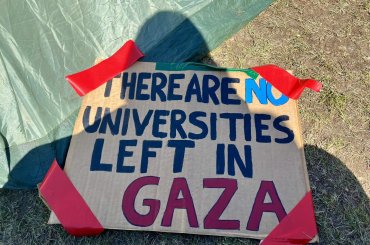
In my last column, “Bari Weiss Wants to speak for the Jews,” I claimed that the winner of the Jewish ideological battle between Bari Weiss and Peter Beinart is going to shape Jewish and in turn American politics on Israel. That’s why it’s so important to continue to closely follow what’s going on between the two. When we left them last we saw Weiss imply that Beinart was collaborating with the “enemies of the Jews” for his (at the time) forthcoming December 15 panel discussion on anti-Semitism, “Dismantling Antisemitism, Winning Justice,” with the BDS-supporting Rashida Tlaib, Marc Lamont Hill, and Barbara Ransby.
After the event, Beinart took his gloves off and responded to his critics. He asserted that he was not the one betraying the Jews. Actually, he was the one being Jewish by engaging with these good people. Defending “Palestinian dignity,” according to Beinart, is “Jewish loyalty,” not Jewish treachery. It is demonizing Palestinians that is the Jewish betrayal, argued Beinart on Twitter:
“The Talmud says human dignity overrides all rabbinic commands. So talking tonight w/ @RashidaTlaib @marclamonthill @BarbaraRansby @AlissaShira about defending human dignity—including Palestinian dignity—constitutes not Jewish betrayal but Jewish loyalty.”
Beinart is no longer showing deference to the Jewish guardians of the communal victimhood discourse. This is yet another, more recent example of Beinart’s “cultural importance.” He is claiming Jewish authority for himself. And he regards Jewish collective victimhood, or the “Holocaust lens,” of his ideological foes in the Jewish world, as “a cancer”:
“This dehumanization [of Palestinians] masquerading as realism is a cancer. It not only turns Palestinians into Nazis, it turns anyone who takes up the Palestinian cause into a Nazi sympathizer, guilty of antisemitism until proven innocent.”
Beinart is now taking the fight to Bari Weiss and the other Jewish spokespeople who see Jew-haters everywhere. He is defending his outreach to Palestinians and their sympathizers on Jewish grounds. His Jewishness has him humanizing Palestinians. He is asking viewers, Do Tlaib, Hill, and Ramsey sound like anti-Semites? Look at them, listen to them. No. They are the hated, not the haters. He made this point again last week after speaking to two Palestinian academic luminaries. He challenged his Jewish listeners, Imagine what it’s like to be Rashid Khalidi or Nadia Abu El-Haj. Look at them. Listen to them. There is no Jew-hatred there. As he tweeted:
I’d particularly encourage people to listen to the last part of this discussion, where Rashid and Nadia talk about what it’s like to be continually called an anti-Semite simply for advocating Palestinian rights, what it does to your life.
In another tweet last week, this time responding to the Democratic Majority for Israel, we again notice the new feisty Beinart no longer turning the other cheek when called a kapo:
I’ve explained before why these talking points crumble under the slightest scrutiny…. But if @DemMaj4Israel wants to call me an anti-Semite to my face, I’m happy to debate the claim. DM me and we’ll find a time.
The longer-form version of Beinart’s argument that anti-Zionism does not equal anti-Semitism can be found in his piece last year in The Guardian.
So where is Bari Weiss? Recall that she started this battle with Beinart. She disparaged Beinart’s antisemitism event in a tweet and also liked this tweet by former Israeli ambassador to the U.N. Dani Dayan:
If you are non-Jews who like to tell Jews what is and what isn’t antisemitism, you are most probably anti-Semites. If you are a Jew collaborating with them, you are most probably their useful idiot.
Bari Weiss’s response to that event has been demonization and character assassination of all the participants. I have already written an essay on Weiss’s use of ritual defamation for personal and ideological advantage.
Ritual defamation is an underhanded attempt to win an argument without arguing. It is potent slander. Bari Weiss’s anti-Semitism book is full of examples of ritual defamation. Just look at how, in her book, she makes sense of Jews who have different views and values than hers. Does she engage with their ideas? No. She says, as it were, do not heed these people. They are “stab in the back” Jews. They are similar to the Jewish traitors that our people have long had in their midst. They are, in her words, “Jewish agents in their own destruction”:
As many well-intentioned people look to understand why a very small but very vocal group of Jews seems as deeply opposed to Jewish interests as many of our community’s enemies, these Jews ought to be understood in context, as part of a long history of leftwing anti-Semitic movements that successfully conscript Jews as agents in their own destruction. (112)
This is “cancel culture” on steroids. This communal discourse is what’s poisoning the Jewish world here and in Israel. Weiss’s response to Beinart and other Jews who differ with her is to ritually defame them. Weiss is making an abhorrent accusation against Jews whom she deems “deeply opposed to Jewish interests.” They have a pathological problem with being Jewish, is her claim. We might ask, why should she get to decide what is and is not in the Jewish interest? But these questions are not typically asked of Weiss because she deploys ritual defamation to make her Jewish opponents and their opinions taboo.
Just look at the two main characteristics of ritual defamation, in the words of its first theorist, Laird Wilcox:
1. “The method of attack in a ritual defamation is to assail the character of the victim. Character assassination is its primary tool. . . . .
2. “An important rule in ritual defamation is to avoid engaging in any kind of debate over the truthfulness or reasonableness of what has been expressed, only condemn it … The primary goal of a ritual defamation is censorship and repression.” (emphasis mine)
Bari Weiss is incapable of debating whether Peter Beinart’s ideas are “Jewish” or anti-Jewish, so she ritually defames him. That has been the Jewish community’s answer to him for a decade now. For the Jewish literati, the so-called “spokespeople for the Jews,” the only solution to Beinart has been demonization and ritual defamation. Recall how, in 2012, Andrew Sullivan described the “assault on Peter Beinart,” as Beinart’s “Crisis of Zionism” book was about to be published. Sullivan was stunned by the “utter lack of engagement with the arguments of a book that has yet to be published.” And Sullivan continued:
I’ve been through my share of personal vilification over the years – because of my stands on marriage, or HIV, or Iraq, or race, or Israel, or you-name-it. But this level of vicious personal obloquy from people who once advanced and supported him? It beggars belief. There is something rotten here. And something utterly bankrupt. You want to know why these people have become so unhinged? Read the book. They’re terrified of its truth.
For more than a decade now, since his 2010 New York Review of Books essay “The Failure of the American Jewish Establishment”, Beinart has had to endure this unjust defamation by his Jewish journalist peers.
The latest is Bari Weiss. But she is in trouble. She seeks to speak for the Jews, but Peter Beinart is in her way. Her dilemma is that the only weapons in her Jewish-war-of- ideas arsenal is censorship and suppression. Her problem is that, as we’ve seen this week, Beinart will no longer be bullied by these “never again” journalists who aim to speak for the Jewish people. He has, for the second time now, won the American Jewish “war of ideas” on Israel, Netanyahu, and “anti-Semitism.” As he continues to challenge the Jewish victimhood narrative and propagate a new Jewish value system, Peter Beinart’s new and old American detractors are lying low.



Bari Weiss is the poster child for the idea that Jews/Israel are “invincible victims” and that’s one of the things that psychologically link the U.S. and Israel – we consider ourselves “invincible victims” as well. Amy Kaplan explores these tropes in her 2018 book “Our American Israel” – from page 277,278:
Critics of BDS have expended great effort to defeat it, claiming that the movement is mortally dangerous to Israel and yet, at the same time, that it has been ineffectual in shaking the fundamental attachment of Americans to Israel…This paradox of extreme vulnerability and fundamental indomitability has been at the heart of the story of “our American Israel.”…the image of the invincible victim continues to underlie a broad cultural consensus about Israel in the U.S….The paradox of power and weakness also informs American’s view of their own place in the world.
1 of 2
Peter Beinart: Bravo!! I salute you!! As for Bari Weiss, she lives in a fantasy world of the privileged.
Here’s a couple of recent examples of the days in the lives of Palestinians forced to live under brutal/illegal Israeli occupation:
Families face imminent evictions in East Jerusalem | The Electronic Intifada
“Families face imminent evictions in East Jerusalem”
Kelly Kunzl The Electronic Intifada 24 December 2020
EXCERPT:
“Mazen Dweik had been warned multiple times by members of the Israeli settler organization Ateret Cohanim.
“If he refused to sell his house in the East Jerusalem neighborhood of Batan al-Hawa to the settlers, they would make sure he and his family lost everything in court.
“Last month, that threat became a reality when a Jerusalem district court upheld a ruling in favor of the far-right group to evict all 30 members – including 12 children – of the Dweik residence.
“Judges rejected the final appeal made by the family in February against a ruling relinquishing full property rights to Ateret Cohanim and ending a more than decade-long legal battle.
“’If there is a god greater than me, then I will stay here until I die,’ Dweik told The Electronic Intifada.
“The family has lived in the five-story building since they bought the property in 1963 when East Jerusalem was still under Jordanian control.
“Since the family first started receiving warnings in 2007, Dweik said he was approached multiple times by Barak Weinberg, who presented himself as a member of Ateret Cohanim and is an employee of a sister organization, Midreshet Kedma.” (cont’d)
2 of 2
Israeli forces abduct more than 400 Palestinians in November, human-rights organisations reveal | Defend Democracy Press
“Israeli forces abduct more than 400 Palestinians in November, human-rights organisations reveal” Defend Democracy Press, Dec. 23/20
EXCERPT:
“ISRAELI forces abducted more than 400 Palestinians from the occupied territories last month, according to a new report.
“The figures were released on Monday by the Palestinian Detainees Committee, the Palestinian Prisoners Society, the Adameer Prisoner Support and Human Rights Association and the Wadi Hilweh Information Centre.
“The human-rights groups denounced the escalating Israeli violations in the occupied territories, ‘especially the illegal collective measures targeting the detainees and their families.’
“They warned that Israeli authorities have failed to protect detainees from the spread of coronavirus, impinging on their basic rights including access to healthcare.
“The data show that Israeli soldiers abducted at least 413 Palestinians from the territories, including 157 from occupied Jerusalem and 74 from Hebron.
“Among them were 49 children and seven women.
“About 4,400 Palestinians are being held in Israeli prisons, including 380 who have been jailed under administrative detention orders — meaning that they can be held without charge or trial.
“Israeli courts issued 102 such orders in November, the groups said, 47 against first-time detainees and 55 renewals.
“In recent months, Israel has escalated actions against leading Palestinian women and their organisations.”
Are the pro-human-rights Jews un-Jewish? Well, if memory serves, there were (anciently) Jews regarded by many as prophets who criticized the locally dominant community party-lines. Seems VERY Jewish to me, but, then, who am I? But the local hot-shots never profess to see it that way. Power never gives up w/o a struggle.
Who was Isaiah anyway?
Bless you, Peter Beinart, for standing up for human dignity, including the dignity of the Palestinian people.